#Philistia
Text
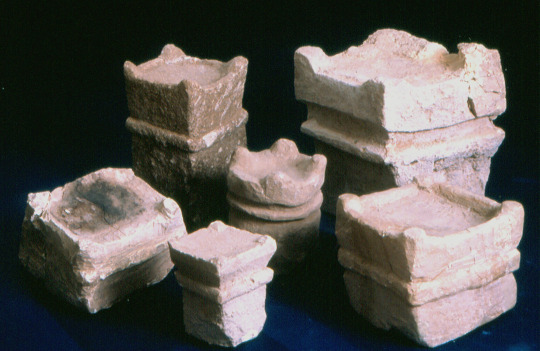
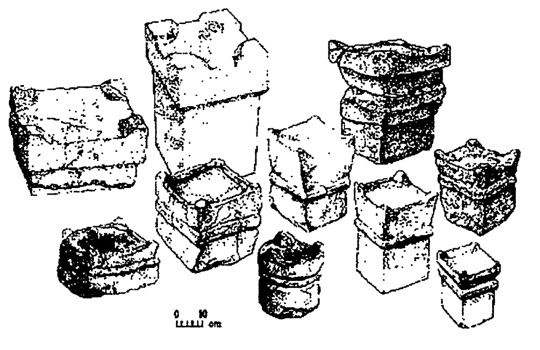
A group of small, portable stone Horned Altars
Ekron, Palestine (Tel Miqne, Israel)
650 BCE.
Source: https://www.asor.org/resources/photo-collection/pid000577
Source: Dothan, Trude, and Seymour Gitin. 2008. Miqne, Tel (Ekron). In The New Encyclopedia of Archaeological Excavations
in the Holy Land 5. Edited by Ephraim Stern. Supplementary Volume. Jerusalem: Israel Exploration Society,
pp. 1952–58.
See Also:
Philistine Cult and Religion According to Archaeological Evidence
by David Ben-Shlomo
Department of Land of Israel Studies and Archaeology, Ariel University, Ariel 40700, Israel
73 notes
·
View notes
Photo

Restoration for Israel
1 But the Lord will have compassion on Jacob and will again choose Israel and will settle them in their own land, and aliens will join them and attach themselves to the house of Jacob. 2 And the nations will take them and bring them to their place, and the house of Israel will possess the nations as male and female slaves in the Lord’s land; they will take captive those who were their captors and rule over those who oppressed them.
Downfall of the King of Babylon
3 When the Lord has given you rest from your pain and turmoil and the hard service with which you were made to serve, 4 you will take up this taunt against the king of Babylon:
How the oppressor has ceased!
How his insolence has ceased!
5
The Lord has broken the staff of the wicked,
the scepter of rulers,
6
that struck down the peoples in wrath
with unceasing blows,
that ruled the nations in anger
with unrelenting persecution.
7
The whole earth is at rest and quiet;
they break forth into singing.
8
The cypresses exult over you,
the cedars of Lebanon, saying,
“Since you were laid low,
no one comes to cut us down.”
9
Sheol beneath is stirred up
to meet you when you come;
it rouses the shades to greet you,
all who were leaders of the earth;
it raises from their thrones
all who were kings of the nations.
10
All of them will speak
and say to you:
“You, too, have become as weak as we!
You have become like us!”
11
Your pomp is brought down to Sheol,
and the sound of your harps;
maggots are the bed beneath you,
and worms are your covering.
12
How you are fallen from heaven,
O Morning Star, son of Dawn!
How you are cut down to the ground,
you who laid the nations low!
13
You said to yourself,
“I will ascend to heaven;
I will raise my throne
above the stars of God;
I will sit on the mount of assembly
on the heights of Zaphon;
14
I will ascend to the tops of the clouds;
I will make myself like the Most High.”
15
But you are brought down to Sheol,
to the depths of the Pit.
16
Those who see you will stare at you
and ponder over you:
“Is this the man who made the earth tremble,
who shook kingdoms,
17
who made the world like a desert
and overthrew its cities,
who would not let his prisoners go home?”
18
All the kings of the nations lie in glory,
each in his own tomb,
19
but you are cast out, away from your grave,
like loathsome carrion,
clothed with the dead, those pierced by the sword,
who go down to the stones of the Pit
like a corpse trampled underfoot.
20
You will not be joined with them in burial
because you have destroyed your land;
you have killed your people.
May the descendants of evildoers
nevermore be named!
21
Prepare a place of slaughter for his sons
because of the guilt of their father.
Let them never rise to possess the earth
or cover the face of the world with cities.
22 I will rise up against them, says the Lord of hosts, and will cut off from Babylon name and remnant, offspring and posterity, says the Lord. 23 And I will make it a possession of the screech owl and pools of water, and I will sweep it with the broom of destruction, says the Lord of hosts.
An Oracle concerning Assyria
24
The Lord of hosts has sworn:
As I have designed,
so shall it be,
and as I have planned,
so shall it come to pass:
25
I will break the Assyrian in my land
and on my mountains trample him under foot;
his yoke shall be removed from them
and his burden from their shoulders.
26
This is the plan that is planned
concerning the whole earth,
and this is the hand that is stretched out
over all the nations.
27
For the Lord of hosts has planned,
and who will annul it?
His hand is stretched out,
and who will turn it back?
An Oracle concerning Philistia
28 In the year that King Ahaz died this oracle came:
29
Do not rejoice, all you Philistines,
that the rod that struck you is broken,
for from the root of the snake will come forth an adder,
and its fruit will be a flying fiery serpent.
30
In my pastures the poor will graze
and the needy lie down in safety,
but I will make your root die of famine,
and your remnant I will kill.
31
Wail, O gate; cry, O city;
melt in fear, O Philistia, all of you!
For smoke comes out of the north,
and there is no straggler in its ranks.
32
What will one answer the messengers of the nation?
“The Lord has founded Zion,
and the needy among his people
will find refuge in her.”
— Isaiah 14 | New Revised Standard Version Updated Edition (NRSVUE)
New Revised Standard Version, Updated Edition. Copyright © 2021 National Council of Churches of Christ in the United States of America. All rights reserved worldwide.
Cross References: Exodus 15:12; Exodus 20:5; Numbers 21:8; 1 Kings 14:10; 2 Kings 16:20; 2 Chronicles 20:6; Ezra 9:8-9; Job 18:16; Job 18:19; Job 21:26; Psalm 29:5; Psalm 47:1; Psalm 125:3; Isaiah 3:14; Isaiah 3:26; Isaiah 5:14; Isaiah 5:25; Isaiah 9:4; Isaiah 10:12; Isaiah 10:14; Isaiah 45:13; Ezekiel 26:20; Ezekiel 32:27; Nahum 3:6; Matthew 11:23; Matthew 23:35; Luke 10:15; Luke 10:18; Luke 12:45; Acts 4:28; Ephesians 2:12; 2 Thessalonians 2:4; Hebrews 11:10; James 2:5
#Israel#restoration#king of Babylon#downfall#God's purpose#Assyria#Philistia#destruction#Isaiah 14#Book of Isaiah#Old Testament#NRSVUE#New Revised Standard Version Bible Updated Edition#National Council of Churches of Christ in the United States of America
8 notes
·
View notes
Text
HER STORY: Exodus Pioneers, Delilah
Deceitful seductress or powerful foe? It all depends on whose side you're on! She managed to best Israel's mighty champion, for Delilah was Philistia's own champion.
“A staggering story of strength… And seduction… of the mightiest mortal who ever lived!” so claimed a poster touting Cecil B. DeMille’s masterpiece theater, “Samson and Delilah.” “A story as timeless and tumultuous as the violent age it spreads before you,” claimed another poster, quoting from Judges 16, “And the lords of the Philistines said unto Delilah, “entice him . . .”
And for the last two…
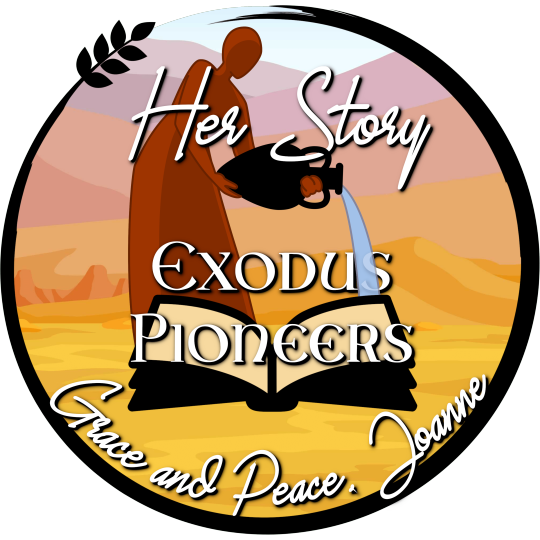
View On WordPress
#Bible study#biblical woman#biblical women#Delilah#egal#Egalitarian#Judges 16#Philistia#philistine#power#Samson#Scripture#seduction#Women in the Bible
1 note
·
View note
Text
Judgement Against Philistia
Zephaniah 2:4-7
4For Gaza shall be forsaken,
And Ashkelon desolate;
They shall drive out Ashdod at noonday,
And Ekron shall be uprooted.
5Woe to the inhabitants of the seacoast,
The nation of the Cherethites!
The word of the Lord is against you,
O Canaan, land of the Philistines:
“I will destroy you;
So there shall be no inhabitant.”
6The seacoast shall be pastures,
With shelters for shepherds…
View On WordPress
0 notes
Text
Lord of All
17 In the twenty-seventh year, in the first month, on the first day of the month, the word of the Lord came to me: 18 “Son of man, Nebuchadnezzar king of Babylon made his army labor hard against Tyre. Every head was made bald, and every shoulder was rubbed bare, yet neither he nor his army got anything from Tyre to pay for the labor that he had performed against her. 19 Therefore thus says the…
View On WordPress
#Ammon#Babylon#Edom#Egypt#Ezekiel#Ezekiel 29#God#holiness#Israel#Judah#judgment#Moab#Nebuchadnezzar#Pharaoh#Philistia#redemption#restoration#restoration of Israel#sovereign will of God#Tyre
0 notes
Text
"My father was born in 1905 in Bethlehem as an Ottoman citizen with Ottoman identification papers. As a teenager he witnessed the Ottomans being replaced by the British, and suddenly, almost overnight, he became a citizen of Mandate Palestine with a Palestinian passport issued by the British Mandate government. In 1949, when Bethlehem became part of Jordan, he became suddenly a citizen of the Hashemite Kingdom of Jordan. And when he died in 1975, he died under Israeli occupation with an ID card issued by Israel. But he was the same person throughout those geo-political vicissitudes and had no choice but to adjust to changing political and imperial realities.
Throughout Palestinian history empires have occupied the land for a certain number of years but were then forced to leave. Most of the time an empire departed only to make space for another empire. The majority of the native people of the land seldom left. Throughout history and starting with the Assyrian Exile, only a small minority was deported, and only a small percentage decided to leave. The vast majority of the native people remained in the land of their forefathers (2 Kgs 25:11). They remained the Am Haaretz, the native 'People of the Land,' in spite of the diverse empires controlling that land. This is why in this book I choose the people of the land as the description for the native inhabitants throughout history, for it is they who are the enduring continuum.
Their identity, however, was forced to change and develop according to the new realities and empires in which they found themselves. They changed their language from Aramaic to Greek to Arabic, while their identity shifted from Canaanite, to Hittite, to Hivite, to Perizzite, to Girgashite, to Amorite, to Jebusite, to Philistine, Israelite, Judaic/Samaritan, to Hasmonaic, to Jewish, to Byzantine, to Arab, to Ottoman, and to Palestinian, to mention some. The name of the country also changed from Canaan to Philistia, to Israel, to Samaria and Juda, to Palestine. ... And yet they stayed, throughout the centuries, and remained the people of the land with a dynamic identity. In this sense Palestinians today stand in historic continuity with biblical Israel. The native people of the land are the Palestinians. The Palestinian people (Muslims, Christians, and Palestinian Jews) are a critical and dynamic continuum from Canaan to biblical times, from Greek, Roman, Arab, and Turkish eras up to the present day. They are the native peoples, who survived those empires and occupations, and they are also the remnant of those invading armies and settlers who decided to remain in the land to integrate rather than to return to their original homelands. The Palestinians are the accumulated outcome of this incredible dynamic history and these massive geo-political developments."
Mitri Raheb, Faith in the Face of Empire: The Bible Through Palestinian Eyes (2012)
193 notes
·
View notes
Note
Palestines “over a millennia” what the fuck?????????? Which millennia? When the Greeks named Philistia? Or when the Romans named it Palestina? Or when the flag was created in the 60s? Like where are we starting from. Or how about the fact that Jews were there also for a millenia predating any mention of Philistia/Palestina/whatever you want to call it. Calling zionists brain dead while you yourself are brain dead isn’t the slay you think it is, it’s sad. Stick to weird ass moth furry oc’s instead of conflicts you just learned about and are using to virtue signal to everyone :)))))))))))
what the fuck are you yapping about lmao israel became a nation in 1948 you lackluster buffoon
also palestine's had history wayyyy back into the BCE era *cough* Nafutian Culture
also would you like to know how a lot of isnotraeli "culture" is also stolen? for example the keffiyeh? the dances? the food? all taken from Arab culture.
do some proper research instead of cherry picking what fulfills your zionist fantasies anon :3
#think anon just proved my point anyways#FREE PALESTINE#anti zionisim#from the river to the sea palestine will be free#butthurt anon alert#isnotrael#israel apartheid#palestine is a country#israel is not a country#🇵🇸🇵🇸🇵🇸
54 notes
·
View notes
Text


PHILISTIA (PALESTINE), Askalon. Circa 425-400 BC. AR Tetradrachm (26mm, 17.10 g, 6h). Imitating Athens dekadrachm issue. Head of Athena right, with frontal eye, wearing circular earring, linear necklace with ball pendants, and crested Attic helmet decorated with two Udjat eyes and an olive leaf over the visor, and a spiral palmette on the bowl / Owl standing facing, wings spread; olive sprig and crescent to upper left, AN (in Phoenician) to upper right; all within incuse square.
52 notes
·
View notes
Text

The land was called Canaan, Judea, Philistia, Palestina and Palestine which means that everyone who ever lived there could be considered a "Palestinian" ... Jews, Arabs, Gentiles, Canaanites, Buddhists, Sikhs, B'hai's, Moslems, Christians, Atheists, Druze, etc. ...
Who the hell is Hamas to decide who is and who isn't a citizen of the area and non-existent State of Palestine ...
33 notes
·
View notes
Text
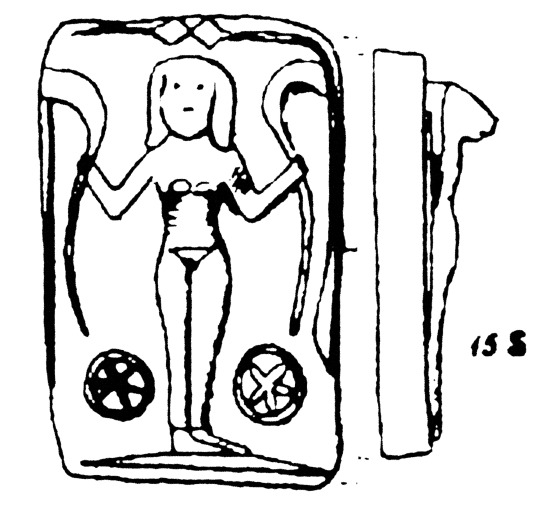
"Astarte Plaque" from Tell es Safi
Source: Bliss & Macalister, Excavations in Palestine, London, 1902, Plate 67 No. 15s
Via: "Star of David" Blog
Tell es-Safi / Gath, Palestine (Tel Tzafit Park, Israel)
c. 800 BCE
Current location unknown, likely stolen from place of origin and lost.
Modern rendition by OP:
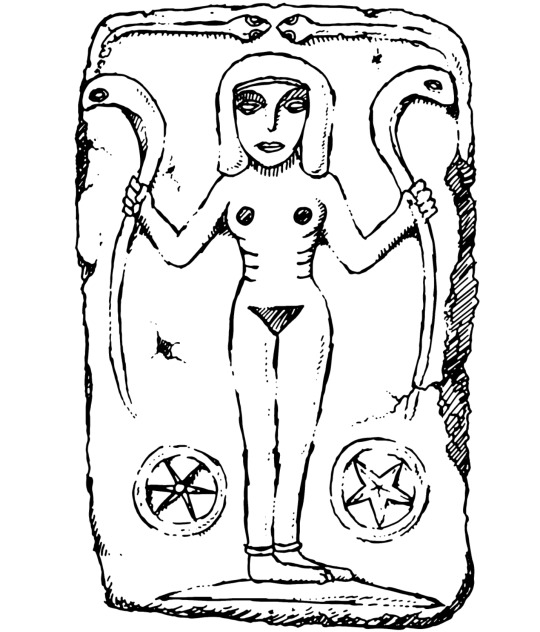
Some interpretative and stylistic liberties were taken in my own drawing. And despite the lack of preserved detail in the original, I very much appreciate the charm of her simple " ꞏ_ꞏ " face.
#canaanite gods#canaan#phoenicia#palestinian gods#palestine#philistia#philistine#astarte#ashtart#anat#anatu#athtartu#snakes#snake#serpent#serpents#star#geometry#asterism#asterisk#venus#hexagram#pentagram#two points up pentagram#two points up hexagram
11 notes
·
View notes
Text
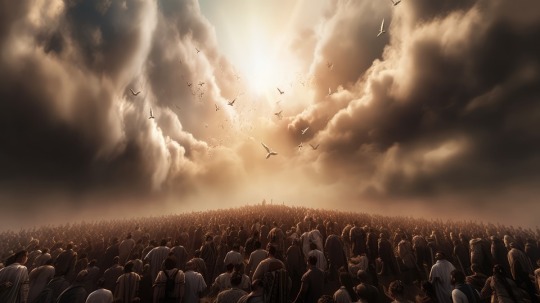
Restoration for Israel
1 But the Lord will take pity on Jacob and again choose Israel, and will settle them on their own land; foreigners will join them and attach themselves to the house of Jacob. 2 The nations will take them and bring them to their place, and the house of Israel will possess them as male and female slaves on the Lord’s land; they will take captive their captors and rule over their oppressors.
Downfall of the King of Babylon
3 On the day when the Lord gives you rest from your sorrow and turmoil, from the hard service with which you served, 4 you will take up this taunt-song against the king of Babylon:
How the oppressor has come to an end!
how the turmoil has ended!
5 The Lord has broken the rod of the wicked,
the staff of the tyrants
6 That struck the peoples in wrath
with relentless blows;
That ruled the nations in anger,
with boundless persecution.
7 The whole earth rests peacefully,
song breaks forth;
8 The very cypresses rejoice over you,
the cedars of Lebanon:
“Now that you are laid to rest,
no one comes to cut us down.”
9 Below, Sheol is all astir
preparing for your coming;
Awakening the shades to greet you,
all the leaders of the earth;
Making all the kings of the nations
rise from their thrones.
10 All of them speak out
and say to you,
“You too have become weak like us,
you are just like us!
11 Down to Sheol your pomp is brought,
the sound of your harps.
Maggots are the couch beneath you,
worms your blanket.”
12 How you have fallen from the heavens,
O Morning Star, son of the dawn!
How you have been cut down to the earth,
you who conquered nations!
13 In your heart you said:
“I will scale the heavens;
Above the stars of God
I will set up my throne;
I will take my seat on the Mount of Assembly,
on the heights of Zaphon.
14 I will ascend above the tops of the clouds;
I will be like the Most High!”
15 No! Down to Sheol you will be brought
to the depths of the pit!
16 When they see you they will stare,
pondering over you:
“Is this the man who made the earth tremble,
who shook kingdoms?
17 Who made the world a wilderness,
razed its cities,
and gave captives no release?”
18 All the kings of the nations lie in glory,
each in his own tomb;
19 But you are cast forth without burial,
like loathsome carrion,
Covered with the slain, with those struck by the sword,
a trampled corpse,
Going down to the very stones of the pit.
20 You will never be together with them in the grave,
For you have ruined your land,
you have slain your people!
Let him never be named,
that offshoot of evil!
21 Make ready to slaughter his sons
for the guilt of their fathers;
Lest they rise and possess the earth,
and fill the breadth of the world with cities.
22 I will rise up against them, says the Lord of hosts, and cut off from Babylon name and remnant, progeny and offspring, says the Lord. 23 I will make it a haunt of hoot owls and a marshland; I will sweep it with the broom of destruction, oracle of the Lord of hosts.
God’s Plan for Assyria
24 The Lord of hosts has sworn:
As I have resolved,
so shall it be;
As I have planned,
so shall it stand:
25 To break the Assyrian in my land
and trample him on my mountains;
Then his yoke shall be removed from them,
and his burden from their shoulder.
26 This is the plan proposed for the whole earth,
and this the hand outstretched over all the nations.
27 The Lord of hosts has planned;
who can thwart him?
His hand is stretched out;
who can turn it back?
Philistia
28 In the year that King Ahaz died, there came this oracle:
29 Do not rejoice, Philistia, not one of you,
that the rod which struck you is broken;
For out of the serpent’s root shall come an adder,
its offspring shall be a flying saraph.
30 In my pastures the poor shall graze,
and the needy lie down in safety;
But I will kill your root with famine
that shall slay even your remnant.
31 Howl, O gate; cry out, O city!
Philistia, all of you melts away!
For there comes a smoke from the north,
without a straggler in its ranks.
32 What will one answer the messengers of the nations?
“The Lord has established Zion,
and in her the afflicted of his people find refuge.”
— Isaiah 14 | New American Bible Revised Edition (NABRE)
The New American Bible, Revised edition © 2010, 1991, 1986, 1970 Confraternity of Christian Doctrine, Inc. All Rights Reserved.
Cross References: Genesis 3:5; Exodus 15:12; Exodus 20:5; Numbers 21:8; 1 Kings 14:10; 2 Kings 16:20; 2 Kings 18:8; 2 Chronicles 20:6; 2 Chronicles 28:27; Ezra 9:8-9; Job 18:16; Job 20:6; Job 23:13; Job 21:26; Psalm 29:5; Psalm 47:1; Psalm 98:1; Psalm 125:3; Proverbs 19:21; Isaiah 3:14-15; Isaiah 3:26; Isaiah 5:14; Isaiah 5:25; Isaiah 7:21-22; Isaiah 9:4; Isaiah 10:12; Isaiah 10:27; Isaiah 11:10; Isaiah 13:1; Isaiah 13:6; Isaiah 13:11; Isaiah 13:15; Isaiah 24:12; Isaiah 31:8; Isaiah 37:24; Isaiah 41:8-9; Isaiah 45:13; Isaiah 51:8; Jeremiah 50:33; Jeremiah 51:62; Lamentations 1:21; Ezekiel 26:20; Ezekiel 28:8; Ezekiel 31:16; Ezekiel 32:21; Ezekiel 32:27; Nahum 1:14; Nahum 3:6; Habakkuk 1:10; Habakkuk 1:17; Matthew 11:23; Matthew 23:35; Luke 10:15; Luke 10:18; Luke 12:45; Acts 4:28; Ephesians 2:12; Hebrews 11:10; James 2:5; 2 Peter 1:19
#Israel#restoration#divine promise#God's purpose#downfall#king of Babylon#Assyria#Philistia#destroyed#Isaiah 14#Book of Isaiah#Old Testament#NABRE#New American Bible Revised Edition#Confraternity of Christian Doctrine Inc.
6 notes
·
View notes
Text
Isaiah 14: Purposes of God
Refuge is found in God
God is the Mighty Sovereign of the universe, Creator, Sustainer, and the One Who holds all accountable to the Word and words of God.
#Isaiah14 #PurposesofGod
Purpose of the Test
God’s focus, in Isaiah’s book, is always centered on Judah. It is from Zion that Isaiah’s prophecies proceed, first to Judah, then to those nations which threatened and warred with Judah. At the beginning of Israel’s settlement in the land, the writer noted,
Now these are the nations that the Lord left to test all those in Israel who had no experience of war in Canaan
(it…

View On WordPress
0 notes
Text
Judgement on Philistia
Ezekiel 25:15-17
15 ‘Thus says the Lord God: “Because the Philistines dealt vengefully and took vengeance with a spiteful heart, to destroy because of the old hatred,” 16 therefore thus says the Lord God: “I will stretch out My hand against the Philistines, and I will cut off the Cherethites and destroy the remnant of the seacoast. 17 I will execute great vengeance on them with furious rebukes;…
View On WordPress
0 notes
Text
Divine Payback
1 The word of the Lord came to me: 2 “Son of man, set your face toward the Ammonites and prophesy against them. 3 Say to the Ammonites, Hear the word of the Lord God: Thus says the Lord God, Because you said, ‘Aha!’ over my sanctuary when it was profaned, and over the land of Israel when it was made desolate, and over the house of Judah when they went into exile, 4 therefore behold, I am handing…
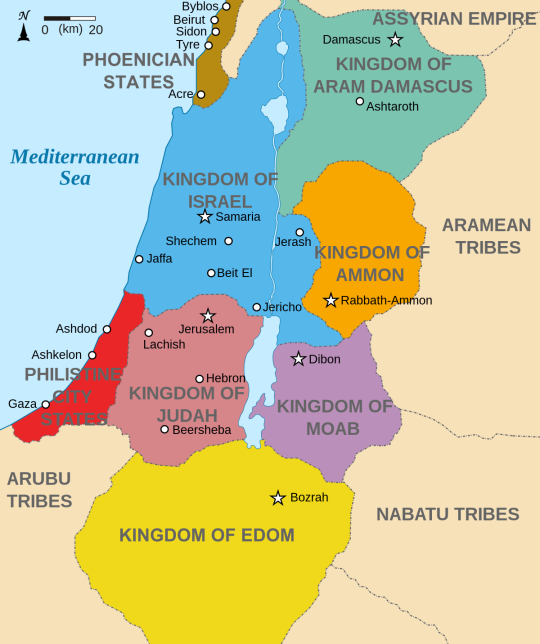
View On WordPress
#Ammon#covenant#Edom#enemies of Israel#Ezekiel#Ezekiel 25#God#Israel#Judah#judgment of God#Moab#Philistia#promises of God#restoration#Yahweh
0 notes
Note
that land has been a graveyard for thousands of years. a dozen empires have conquered and fallen on that land. from ancient egypt to the ottoman empire at the end of world war one. the throughline is the jews. they have been there since the late bronze age. a thousand years before islam and the arab conquest of the levant. i say good for the jews for still being there, still hanging on to their native land. and good for them for fighting for it. if you can't be bothered to actually read some history books, just look up "kingdom of israel" on wikipedia. then look up "philistia".
I don't think living there a thousand years ago justifies destroying it with bombs or slaughtering thousands, actually.
27 notes
·
View notes
Text
Accessibility statementSkip to main content
Resubscribe
OPINIONSEditorialsColumnsGuest opinionsCartoonsSubmit a guest opinionToday's Opinions newsletter
This Easter, let’s not try to pretend Jesus was a ‘Palestinian Jew’
By Paula Fredriksen
March 28, 2024 at 6:00 a.m. EDT
Paula Fredriksen, Aurelio professor of scripture emerita at Boston University, is a historian of ancient Christianity and the author of “When Christians Were Jews” and “Jesus of Nazareth, King of the Jews.”
Easter marks the resurrection of Jesus, but this year the holiday comes with a twist: Jesus resurrected as Palestinian. Never mind that Jesus was born and died a Jew in Judaea. From the pronouncement of a member of Congress to the pages of the Encyclopaedia Britannica, Jesus is now heralded as a “Palestinian” or, more delicately, as a “Palestinian Jew.”
Jesus made an appearance on social media as a “Palestinian” around Christmas, and the meme has flourished since then. The gambit casts 1st-century Jews in the role of an occupying power and “Palestinians” as their victims. Just as Herod, the king of Judaea in Jesus’ time, persecuted the “Palestinian” holy family of Jesus, Mary and Joseph, so, too, goes the claim, is modern Israel an occupying power persecuting Palestinians today.
So caught up were these advocates in their own spin that they mischaracterized reality. In a Christmastime post on Instagram, Rep. Alexandria Ocasio-Cortez (D-N.Y.) condemned modern Israelis as “right-wing forces violently occupying Bethlehem.” But Bethlehem has been administered by the Palestinian Authority since 1995. Once a significant majority there, the Christian population plunged from 86 percent in 1950 to less than 12 percent in 2016.
As for the Gaza Strip, it is even less hospitable to Christians. As the New Yorker reported in January, a count by the Catholic Church in Gaza, “once home to a thriving Christian community,” found just 1,017 Christians, amid a population of more than 2 million. After seizing control of Gaza in 2007, Hamas ended the designation of Christmas as a public holiday and discouraged its celebration. The dwindling population of Gazan Christians has been harassed, intimidated, even murdered. Were Jesus to show up in modern-day Gaza, he would find an extremely hostile environment.
So how did Jesus end up “Palestinian”?
Roughly 3,000 years ago, on the eastern rim of the Mediterranean, a coastal confederation of five cities stretched from Gaza into Lebanon. The Bible refers to this zone as Philistia, the land of the Philistines. In 430 B.C., the Greek historian Herodotus, translating this term, gestured toward the broader area as “Palaistinē.”
To the east, the region of the biblical highlands was called Yehudah. The name predates Herodotus by centuries. By Jesus’ lifetime, the Romans labeled this whole area, coast and highlands together, as “Judaea,” a Latinization of “Yehudah.” The people living in Judaea were called “Iudaei”: “Judeans” or “Jews.” Their temple in Jerusalem, the focus of their ancestral worship since the first millennium B.C., was sacred to Jesus, which is why the gospels depict him as journeying there for pilgrimage holidays. An ethnic Judean, Jesus was, accordingly, a Jew.
Where, then, did the name “Palestine” come from? From a foreign imperial colonizing power: Rome. Judeans revolted twice against the Romans. The first revolt, from A.D. 66 to 73, reached an awful climax with the destruction of the Jewish temple in Jerusalem. Still, Rome kept “Judaea” as the region’s designation. But in A.D. 132-135, the Jews again revolted. By that point, Rome had had enough. The empire changed the administrative name of the region to “Syria-Palestina” — a full century after Jesus’ death. It was a deliberate way to “de-Judaize” the territory by using the throwback term for the coastal Philistines.
What does this mean? It means that Jesus was not “Palestinian.” Nor was he a “Palestinian Jew.” This is so for a simple reason: There was no political entity called “Palestine” in his lifetime. If Jesus was born in Bethlehem, he was born in Judaea as a Jew. He certainly died as one, under Rome’s heavy hand — the political condition that led to the two Jewish revolts.
It was Roman colonizers who changed the name of Judaea to Palestine.
Why rehearse this well-known history? Because now, in the current crisis, even Jesus is being enlisted for attacks on Israel. Calling Jesus a “Palestinian” or even a “Palestinian Jew” is all about modern politics. Besides being historically false, the claim is inflammatory. For two millennia, Jews have been blamed for Jesus’ execution by the Romans; casting him as a Palestinian just stokes the fires of hate, using Jesus against Jews once again.
It is, further, an act of cultural and political appropriation — and a clever rhetorical move. It rips Jesus out of his Jewish context. And it rips 1st-century Jews — and 21st-century Israeli Jews — out of their ancestral homeland, turning them into interlopers. This is polemic masquerading as history.
There have already been too many casualties since Oct. 7. Let’s not allow history to be one of them.
17 notes
·
View notes